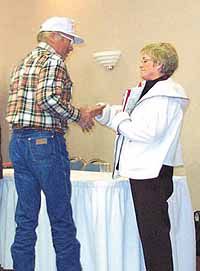Newly confirmed Bureau of Land Management director, Kathleen Clarke spoke at the Rangeland and Livestock Conference on Jan. 21 in St. George. The conference was sponsored by the Utah Farm Bureau Federation and Utah State University Extension.
Clarke said, “I am a Utah girl with a great affinity for farmers and ranchers and I consider them the salt of the earth for their values and character. We have a generation of children who have lost touch with the land. They think milk comes from the store.
“I went to Utah State University. I started out in law school but I didn’t like the competition so I went into land management. I worked with Jim Hansen in the early 80s and rode the land and the range. Ranchers were just beginning to feel the impacts of the laws from the 70s. They never knew the legislation nor did they comment on it. It affected them and they didn’t know anything about it.
“People need to take the time to get involved early in the process by attending scoping meetings and making comments. I know it’s hard to take the time but it is very important. I learned a great deal working with Jim (Hansen). I’ve worked with the Utah Department of Natural Resources for the last nine years. Each of the eight divisions formulated their own philosophy and they were all independent. The wildlife people didn’t talk to the water people and so on. They managed in a vacuum. There are no boundaries between water, forest and cows. They all exist together. We worked to build a team internally and engaged with the public. We put our heads together to find answers to problems. If two heads are better than one then 10 heads are better than two.
“We formed partnerships and found solutions. The natural resources of a country are the foundation of the quality of life in that country. The natural resources are a measure of the wealth and potential of that country. The United States has always been thought of as wealthy because of the quality of life, the soil, the rangelands, the water. The standard of living as well as the recreation and aesthetic, spiritual value of our public lands; we all love that, the peace and inspiration. The challenge is finding a balance between protection, recreation and economic interests.
“I received a surprise call from the White House asking me to accept the position of director of the BLM. I love Utah and didn’t want to leave so I told them I didn’t want it. Two months later they called back and asked me to reconsider. I care deeply for the West and its land and people so I accepted. This began a four month roller coaster ride. They did an extensive background check. They talked to my ex-husband and my kindergarten teacher. I attended a retreat with Secretary of the Interior Gale Norton and other Bush officials. This was a good beginning, they are committed and capable. This is my first official appearance as the BLM Director.
“I have been sued once a day since becoming the director. BLM currently has 23 active lawsuits. Eighty-five percent of all grazing renewals are being challenged in court in Utah. This arena of contention is hard to manage and it uses up the budget,” said Clarke.
Clarke lists some challenges as building connectivity between agencies and streamlining processes. She sees the opportunity to do positive things on the ground. The budget for the forest service is $6 per acre and the budget for the BLM is $2.20 per acre. Clarke sees this budget differential as an opportunity for creative land management on the part of the BLM.
Clarke said, “There are no lands anywhere more controversial than in Utah. The monies being spent in defense of lawsuits are taking away from other uses.”
Clarke stressed her desire to create partnerships with local agencies, states and counties. Another priority is to support the Bush Administration in their efforts for less government, more local control and promoting families and personal responsibility. She expressed her support of Secretary Norton and working as partners. Clarke described Bush’s energy plan as a huge challenge involving BLM, which she supports.
Clarke said her personal priority would be the people with which she serves and being considerate and respectful of the people she works for. She stressed that she will work with integrity to uphold the laws. She said she was thankful to be a steward of the land and wants the BLM to partner with local citizens in an atmosphere of mutual respect.
Clarke used the example of a home she is renting in Washington. The people couldn’t sell the house, but they are renting it to her because they want a caretaker in the home. They realize it is better than leaving it vacant. She likened this to the rancher who is the caretaker of the public lands on which his cattle graze; the land is better off because of the cattle and the ranchers concern with the land.
Clarke emphasized that she will be sensitive to grazing needs and managing the land for all values and all land uses. Her vision is to find a common ground and to refocus; it is her hope that money will be used to benefit the land instead of fight lawsuits. Clarke said after the September 11 events the law suits stopped coming in for a bit. “We need to build bridges because the problems belong to all of us. We need a joint commitment, we have an enormous responsibility to pull together to help accomplish these goals,” said Clarke.
New BLM Director Attends Conference

